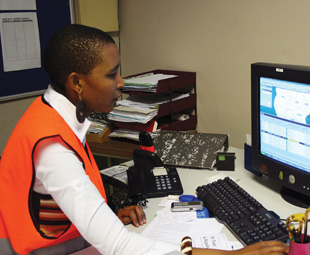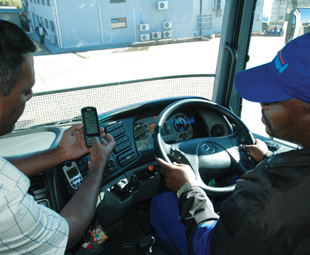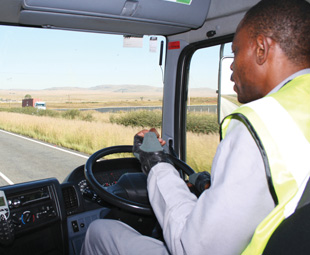Transcending new frontiers

Today’s fleet management systems bring to market new offerings that promise greater control of mobile assets with less hassle and more return on investment. FOCUS explores the latest innovations and insights.
The convergence of vehicle, cellular, satellite and computer technologies has revolutionised the way modern fleets are managed. In 2011, the developers of fleet management systems (FMS) and vehicle tracking systems (VTS) are bringing to market a host of new offerings that promise greater control of mobile assets in a time-efficient manner and economically.
When they first appeared on the market some 20 years ago, FMS and VTS services offered fleet owners a means of tracking the movements of their vehicles on a desktop computer. As they evolved, these systems began to include the fitment of sensors to various components of the vehicle to monitor critical areas like speed, braking and engine revving. With the advent of GPS, GPRS and the Internet, FMS/VTS included functionality such as geo-fencing, enhanced data delivery in real-time at lower cost, more detailed exception reporting, in-vehicle communications (voice and SMS) and driver identification tags linked to individual vehicles.
Over the past five years, both FMS and VTS have accelerated in their technological development to a point where fleet managers have remote access to such a broad spectrum of vehicle and driver information, they could virtually be sitting inside the vehicle itself.
 Having ‘complete visibility’ of mobile assets (both human and automotive) is the mission for fleet owners today, to not only improve safety, efficiency and profitability, but also to comply with new safety and environmental legislation.
Having ‘complete visibility’ of mobile assets (both human and automotive) is the mission for fleet owners today, to not only improve safety, efficiency and profitability, but also to comply with new safety and environmental legislation.
South African FMS and VTS developers are at the forefront of the global telematics industry, a consequence no doubt of having to satisfy the needs of fleet owners who operate in an extremely challenging environment. The imperatives for fleet managers today include minimising vehicle operating costs (fuel, tyres, driveline repairs, accident damage, theft, insurance), improving driver competency and logistics lead times, reporting on CO2 emissions and generally, having the ability to access accurate and relevant fleet intelligence at the press of a button, from a laptop or mobile phone.
As Charles Tasker, CEO of MiX Telematics, puts it: “More sophisticated, faster applications put more control in the hands of users and will be a key differentiator between telematics services. The Fleet Manager range from MiX Telematics provides much-needed information ranging from vehicle and driver performance to vehicle tracking, from driver behaviour to two-way messaging and navigation.”
Key features of leading-edge FMS offerings currently include reporting modules covering driver behaviour scoring, fuel consumption reporting (via CANbus and fuel-flow meters), tachometer reports, CO2 reports, ‘Best Practice’ fleet management consulting, full system customisation, integration with aftermarket vehicle systems (on-board weighing, navigation, PTO and others), integration back-office software applications (ERP, fuel management systems, vehicle scheduling and more), optional engine protection and in-vehicle voice kits.
For Paul Roberts, managing director, Orchid Telematics: “The focal point of a company’s efforts to manage running costs, promote responsible driving habits, reduce fuel consumption and therefore carbon emissions, is the truck driver. To realise the full potential and Return on Investment (ROI) from fleet management solutions, it’s imperative that there is commitment from management to use the tools for fleet optimisation and driver training. Post trip analysis and performance awards measured through scorecards are essential tools but so too are real-time in-cab alerts when agreed driving exceptions such as speeding occur, effectively putting the fleet manager in the cab with the driver.”
 Safety will always be a primary factor and top FMS offerings like Orchid FMS 5 generate real-time driver-fatigue alerts to help prevent accidents. Self-powered tracking units as supplied by Mtrack are also gaining popularity to help recover trailers and cargo from theft and hijacking incidents.
Safety will always be a primary factor and top FMS offerings like Orchid FMS 5 generate real-time driver-fatigue alerts to help prevent accidents. Self-powered tracking units as supplied by Mtrack are also gaining popularity to help recover trailers and cargo from theft and hijacking incidents.
While conventional FMS services deliver fleet intelligence based on data gathered from on-board computers, the use of video technology to monitor driver behaviour and on-road incidents is gaining momentum locally, as is leveraging the assistance of the motoring public to report risky driving.
Pioneering this approach to driver-behaviour management is Drive Report, supplying ‘Report my Driving’ bumper stickers/call-centre services and DriveCam (in-cab ‘smart-camera’) services to the southern African fleet market.
“Drive Report and DriveCam bring the power of ‘sight and sound’ to the fleet management toolkit, using eyewitness reports and video clips that can be successfully used in conjunction with FMS data to help improve driver behaviour and competency,” explains Louis Swart, Drive Report’s managing director. “Drive Report uses the millions of motorists who own cellphones to help keep fleet drivers on their toes, while DriveCam uses a 3G-enabled (dual-lens, in-cab, exception-based) video event recorder to monitor untoward driving behaviour, by the driver or other road users. Both offerings come with sophisticated web-based reporting software. DriveCam’s ‘Managed Services’ ensure fleet managers are fed only the information that represents a real risk to the safety of the fleet – indicating, for example, which drivers need urgent coaching.”
The ‘check-list’ for fleet managers grows every year but FMS/VTS developers are coming to the party. It is clear that more emphasis is being placed on managing driver competency via various technologies in order to boost skills levels, road safety and driver retention. It’s all about swift access to relevant fleet intelligence. With smarter drivers and smarter management systems, fleets can meet all their mission-critical objectives and improve profitability, week by week.
Ctrack launches FleetConnect
Ctrack has launched FleetConnect, a comprehensive fleet management solution that provides fleet owners with full visibility of costs and information on every kilometre driven
This intelligent tool encompasses a specialised software suite with which owners can manage anything from fuel usage, licence renewals and traffic offences to toll fees, vehicle service schedules, driver profiles and any other aspect of their fleet by simply selecting the specific management tools they require.
The suite provides a number of main management areas including: needs analysis, procurement, administration and disposal. However, it can be tailor-made to suit any fleet’s needs and requirements. It offers fleet operators a host of benefits, including reliable, real-time management information for informed decision-making; optimised visibility of vehicle operating costs (maintenance, fuel, tyres, batteries and labour); improved safety of vehicles, drivers and loads; and an automated comparison of actual operating cost versus owner and industry benchmarks.
Increased operational efficiency should result, thanks to optimised maintenance planning, delivery routing and scheduling. Furthermore, operators can buy the right asset/vehicle at the right price for the job required.
“Ctrack FleetConnect integrates all components of fleet management into a singular centralised database, which serves as a one-stop platform. It assists fleet operators to not only understand their businesses’ fleet better – by highlighting opportunities to manage risk more efficiently and assessing how one can identify and streamline fleet operations – but also helps them to monitor budget and costs,” explains Hein Jordt, managing director of Ctrack Fleet Management.
Watching every drop
As much as 50% of a commercial road fleet’s operating expenses are fuel purchases, making it imperative for fleet owners to manage fuel consumption across all their vehicles, down to the litre.
According to Orchid Telematics’ CEO, Paul Roberts, fuel consumption figures are probably the most accurate gauge of driver competency and vehicle fitness, and how effectively the ‘man and machine’ are working together. “An unskilled driver in a poorly serviced vehicle will consume more fuel than a skilled driver in a properly maintained vehicle. The solution is to have the right systems in place to constantly and accurately monitor fuel use so that corrective action can be taken if consumption figures exceed the operation’s benchmarks,” he tells FOCUS.
A subsidiary of Thales Group (a world leader in developing and installing mission critical information systems for the aerospace, defence and security markets), Orchid Telematics has an extensive Southern African footprint, servicing leading private and corporate road fleets via its proprietary fleet management system, Orchid FMS 5.
“At Orchid Telematics, the highest focus is placed on continuous research and development, which enables us to provide our clients with the most effective and up-to-date technological solutions,” says Roberts. “In some of our larger fleet clients, Orchid FMS 5 has cut fuel costs by several million rands per annum.”
By monitoring various critical areas concerning driver behaviour and vehicle status, Orchid FMS 5 delivers accurate real-time reports to clients showing consumption figures for each vehicle/driver on a trip-by-trip basis, and can also generate a CO2 Emissions Report for each vehicle, a feature that will become a ‘must have’ in the near future when legislation is passed governing the environmental impact of road fleets in South Africa.
To facilitate a 360-degree view of mobile assets, Orchid FMS 5 comprises five core modules, including Fleet Base (a secure information database), Fleet Mapper (state-of-the-art maps and visuals), Fleet Reporter (generates standard and customised reports giving snapshots of critical information on an immediate, daily, weekly or monthly basis), Fleet Editor (allows users to edit and customise the information they wish to see) and Fleet Interface (enables users to integrate data into their own back-office software system).
Fleet leasing removes uncertainty
The realisation that fleet leasing offers financial certainty in an uncertain operational sector, a substantially reduced risk and value added products that make effective control of vehicles part of a simple “one-stop” process, is causing some South African businesses to re-evaluate their traditional strategy of owning vehicles, says David Molapo, managing director of Standard Bank Fleet Management.
According to Molapo, the fundamental difference between South African fleet operators and their European counterparts is based in part on local companies still largely preferring to own their assets, whilst internationally operators concentrate on usage of the asset and then handing vehicles back to fleet finance companies when their designated service lives have expired.
“However, more South African fleet owners are beginning to realise that leasing, especially full maintenance leasing, offers substantial operating benefits. One of the primary advantages is that the risks associated with fleet ownership remain with the financier as ownership of the vehicles involved is never transferred.
“With a full maintenance lease, costs – which are linked to the ruling prime interest rates – remain predictable for the duration of the lease agreement. The unexpected financial surprises that can arise from major unplanned mechanical repair bills are avoided entirely.
“The hidden benefit is that vehicles on lease undergo regular servicing and maintenance and therefore remain mechanically reliable for the duration of the lease. It is not uncommon for vehicles in privately owned fleets to miss planned maintenance intervals when lengthening vehicle service intervals are seen as a means to quickly reduce costs in the business. This saving is short-lived as in the longer-term vehicle reliability can be compromised and costs therefore increase,” Molapo says.
“Leasing enables owners, who may have opted for defined lease periods less than the maximum five years, to extend the term of the lease for the full five-year period,” says Molapo.
“In the event that the agreed parameters are not reached or exceeded, leasing costs are accordingly adjusted. We have also negotiated sale and lease-back agreements with fleet owners who have decided to switch from the ownership model to leasing.”
Molapo says the “one-stop shop” advantage was being increasingly understood by fleet owners. Value added products such as fleet cards to track expenses, accessories and tracking devices could be specified upfront and fitted to vehicles, whilst options such as roadside assistance, accident management and driver training could be selected to offer peace of mind. “The fleet management report, which offers comprehensive information on the fleet, is the final advantage to the fleet manager. Full reports on each vehicle identify, for example, where vehicle abuse is taking place. Fuel consumption that is above average is pointed out and vehicles can be fully monitored with little effort.”
Soon, fleet managers will also be able to access data on the company’s carbon footprint, a valuable addition to the report when the fleet operator is part of a multi-national company where this input is becoming increasingly part of required operating reports.
Imperial Fleet Management relieves the risk
Fleet owners who have financed their own fleets could suffer a marked effect on their balance sheets as these used vehicle assets decline in value, says Nicholas de Canha, CEO of Imperial Fleet Management. This factor alone, he believes, makes Imperial Fleet Management off-balance sheet financed vehicles even more attractive when one takes into account that residual values (RVs) are guaranteed.
 With this option, Imperial Fleet Management holds the asset on its balance sheet, and all rentals incorporate RVs. Imperial than takes full risk on RV and therefore risk on termination is eliminated entirely, he says.
With this option, Imperial Fleet Management holds the asset on its balance sheet, and all rentals incorporate RVs. Imperial than takes full risk on RV and therefore risk on termination is eliminated entirely, he says.
De Canha points to the requirements of the International Financial Reporting Standards (FRS). The new IAS standards may require all companies to put all leased assets including vehicles back onto the balance sheet. “The change in accounting standards will affect all businesses equally. Our focus at Imperial is on customer service and lowering operational costs through leasing, rather than outright purchase. We can show that clients receive a much better return on equity, lower their costs and improve their cash position with leasing options,” he says.
Imperial, the largest retail new and used vehicle network with 250 dealers countrywide, is able to offer companies the best RV on leased vehicles. Imperial is also the largest contract service and maintenance plan provider in the country and the high RVs together with competitive maintenance rates enables IFM to provide extremely low full maintenance rentals. The full maintenance rental enables clients to budget accurately as all the maintenance and depreciation is catered for in the single, stable payment that allows clients to concentrate on their core business rather than having to concern themselves with running a fleet.
MiX launches supply chain solution
MiX Telematics has partnered with Intellichain, a South African-based software solution company that focuses on supply chain execution and fleet management. The collaboration will translate into specialised cross-platform supply chain solutions for MiX Telematics’ enterprise fleet customers.
In conjunction with MiX Telematics’ industry leading fleet management solutions, customers can now benefit from end-to-end, integrated supply chain management solutions that incorporate modules such as asset management, driver management, fuel management, stock management, routing and scheduling and transport execution management.
Gert Pretorius, managing director of MiX Telematics (Enterprise), says, “In addition, the bespoke integration development capability expected to result from the partnership will lead to a streamlined, integrated and customised solution for our customers, between their new and existing hardware and software systems. This value-add service will enable our commercial fleet customers to optimise their business processes accordingly.”
The enhanced integration capability will further enable MiX Telematics to provide fresh and valuable insights into customers’ operations, helping them to reduce fleet operating costs and enhance overall levels of efficiency, effectiveness and productivity. Both MiX Telematics and Intellichain are acutely aware that the power of shared supply chain information in real-time and on an efficient basis, will be the only competitive advantage that matters for their customers in the future.
Willem Cilliers, managing director of Intellichain, adds, “An intelligent technology approach and better use of real-time tracking information equips customers in the supply chain arena with evolving functionality and provides them with a single view across their operation, thereby enabling effective management of operations and continuous business growth.”
Published by
Focus on Transport
focusmagsa



